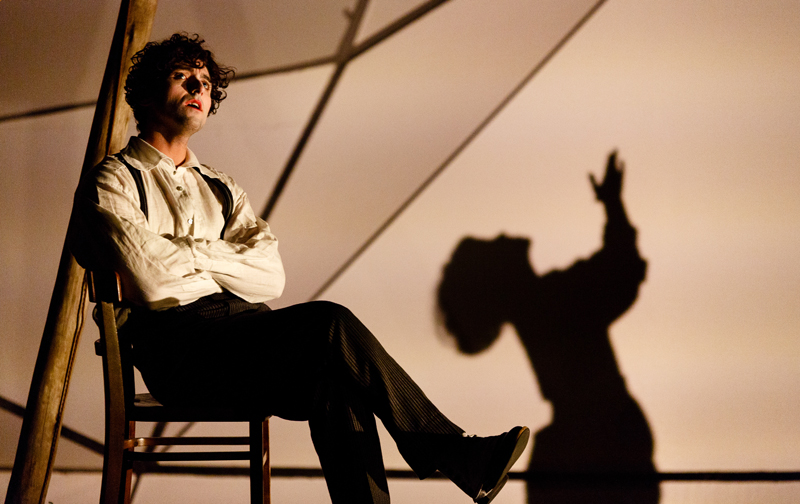 Marc Chagall and his beloved Bella would surely have loved this magical synthesis of moving pictures, words, music and song. It is also a glorious and seamless synthesis of the talents of a superb creative and performing team.
Marc Chagall and his beloved Bella would surely have loved this magical synthesis of moving pictures, words, music and song. It is also a glorious and seamless synthesis of the talents of a superb creative and performing team.
Writer Daniel Jamieson and director Emma Rice got to know the couple intimately when they played the roles in an early version of his play. Now they return to realise their vision anew and share it with a new audience. Of course the two multi-talented actors, Marc Antolin and Audrey Brisson, are at the heart of the vision, bodies intertwining as they sing and speak, and seemingly floating above Sophia Clist’s quirky Chagallesque machine for acting on, all crazy angles, rakes, beams and crannies thanks to Etta Murfitt’s choreography and Malcolm Rippeth’s gorgeous, painterly lighting.
Brisson is an accomplished acrobat, her background with Cirque du Soleil, as well as a soprano with a glorious voice and Antolin matches her note-for-note, move-for-move. But there are actually four performers on stage more or less throughout – composer Ian Ross, together with fellow multi-instrumentalist James Gow, plays his own haunting atmospheric music, often with a klezmer vibe as appropriate, underscoring most of the action. And they play a range of supporting roles in the story, moving from side to centre stage as the story demands.
So the production ravishes the senses, it’s a sort of total immersion in the world Chagall creates in his paintings. And happily Jamieson spins the story of the lives and loves, the talents and aspirations of Chagall, and Bella too. He conjures their world in early 20th-century Europe, from Vitebsk to Moscow in the East, to the heady Paris of iconoclastic new art movements, Fauvism and Cubism in the West. So Jamieson effortlessly introduces the promising but poor young artist and the daughter of the wealthy owners of a trio of jewellery shops. Bella’s recollection of their first meeting is deliciously sensual and sexy, wonderfully reinforced by the intertwining of the lovers’ limbs, hers clad in bright scarlet, for Clist’s costumes vividly evoke the figures of the lovers in Chagall’s paintings.
Both are caught up in the world-changing events of the First World War and the Russian Revolution and are affected by the antisemitism and pogroms that swept across Eastern Europe. Tellingly, this makes the second half altogether a darker and more monochrome affair than the bewitchingly colourful first half. Life in a Moscow torn by war and revolution is dreary for Bella, left alone all day while Chagall seeks to make a living working in an equally dreary bank until he tries to make his mark under the new order.
Unsurprisingly, but almost heartbreakingly, Bella, one of the four brightest students in Russia, subsumes her potential, even as she recognises and encourages her husband’s genius. She reproaches him surprisingly gently for his selfish tunnel vision, especially considering he misses the birth of their daughter Ida by several days because he is absorbed in finishing work on a series of canvases.
Nonetheless Bella gets to take acting classes with Stanislavsky and later works with the legendary Yiddish theatre actor Mikhoels, so it is thanks to her that Chagall is commissioned to paint backdrops for the Jewish Theatre; work that proves to be among his favourite and most fulfilling.
As they migrate across Europe and then flee to America, they take with them the baggage of the world of the shtetl, movingly evoked by objects and animals from the paintings that they carry or wear as headgear – a cockerel here, a cow there, and an etrog (the lemon-like citrus fruit used ritually at the Jewish harvest festival Sukkot) to boot. Thus the stage is peopled not just by the cast of four, but by images of a lost world. At one point it's almost heartbreaking when you see a painting of a fleeing rabbi created by Chagall as he falls into an exhausted sleep, his arms provided by Bella’s (protruding through holes in the canvas), which chimes with the flight of refugees across Europe today, just as Jamieson intended.
Eventually they reach safety in New York and it takes Bella's death during the Second World War to wake Chagall from the solipsistic tunnel vision of the selfish artist and go some way towards realising her potential by publishing her writings before his return to Europe. There his work flowers, he settles with his second wife Valentina, and ends his days in the South of France.
But let’s leave them looking back at the height of their love, early on that glorious morning of his birthday when she surprised him by flitting over his windowsill bearing armfuls of colourful flowers. There’s a gorgeous synaesthesia in a declaration of Chagall's: “My whole life is pervaded by the colour of loving you”, and it’s wonderfully realised in this transcendent production.
By Judi Herman
The Flying Lovers of Vitebsk runs in Bristol until Saturday 11 June, 7.30pm & 2.30pm, £7.50-£30, Bristol Old Vic, BS1 4ED; 0117 987 7877. www.bristololdvic.org.uk
In London from Thursday 16 June – Saturday 2 July, 8pm & 2.30pm, £10-£62, at Shakespeare’s Globe, 21 New Globe Walk, SE1 9DT; 020 7902 1400. www.shakespearesglobe.com
In Southampton from Tuesday 5 – Saturday 9 July, 7.30pm & 2.30pm, £10-£25, Nuffield Theatre, SO17 1TR; 023 8067 1771. www.nuffieldtheatre.co.uk
In Cornwall from Thursday 14 – Sunday 31 July, 7.45pm & 3pm, £14-£32, Lost Gardens of Heligan, PL26 6EN; 01872 262466. www.hallforcornwall.co.uk



